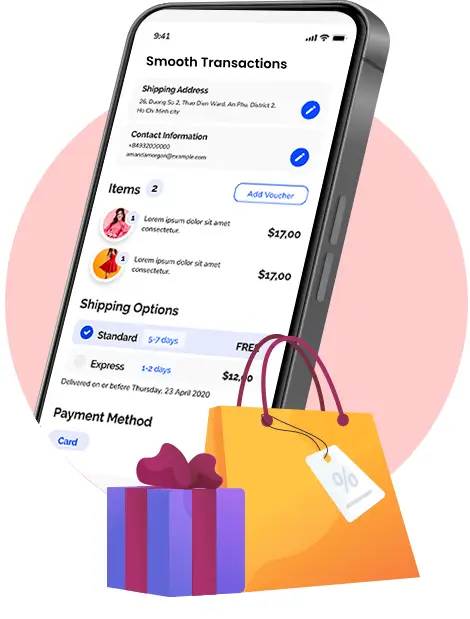Mobile Ecommerce App Builders vs. Custom Development: Which is Better?

Many merchants want a mobile app presence for their store but wrestle with whether to use a builder platform or go fully custom. Decisions around speed, cost, design, and flexibility define success. Custom ecommerce app development offers bespoke experiences, full control over features, and tighter alignment with brand. App builders promise quick launch, low upfront cost, and less technical overhead. This blog explores types of ecommerce software, what mobile ecommerce app builders are, and how to decide which route serves your business best—so you can avoid wasted budget and regret.

Understanding Types of Ecommerce Software
A variety of platforms exist for B2B ecommerce platform development: standalone app builders, SaaS storefronts, headless commerce systems, and fully custom platforms built from scratch. Some offer plug‑and‑play features like themes, payment gateways, shipping calculators, or loyalty modules. Others focus on customization, integrations, performance tuning, security, or scalability. Apps built with cross‑platform tools or native tech differ in performance, upgrade overhead, and cost. Brands that grow fast often outgrow simple templates and need deeper capability. Awareness of available options helps clarify what features matter for your product catalog, user experience, customer base, and long‑term growth.
What Are Mobile Ecommerce App Builders?
Mobile ecommerce app builders serve businesses trying to launch apps without large developer teams. They often offer drag‑and‑drop UIs, ready templates for product display, cart functions, basic analytics, and hosting. Subscription pricing tends to scale by number of products or monthly active users. Features such as push notifications, basic customization, or store syncing usually come standard, but more complex or unique flows may be limited. Entrepreneurs who focus more on branding and marketing than tech often choose the best ecommerce development tools. When speed to market and predictable costs take priority, these tools appear very attractive.
Mobile Ecommerce App Builders vs. Custom Development: Which One to Choose?
Choosing between builder and custom ecommerce mobile app development depends on your business goals, expectations, and resources.
Speed vs Customization
Builder platforms get your app in front of users quickly, often in days or weeks. Custom development requires more time: planning, design, coding, testing. Builders simplify many tasks but limit deeper customization. Unique UX patterns, advanced checkout logic, or specialized integrations require custom work.
Cost Structure
Monthly or yearly subscription fees make builders easier to budget. Custom projects usually begin with higher upfront costs: architecture, UI/UX, feature development, QA. Over time, maintenance, upgrades, and scaling add ongoing costs. Brands expecting to scale heavily often find custom development more cost‑efficient in long run.
Performance and Scalability
High traffic, complex catalog structures, real‑time inventory, offline access or native features tend to strain builder limits. Custom apps allow optimization specific to platform (iOS, Android), efficient use of device hardware, and more control over performance tuning. Latency issues or template constraints surface sooner with builder tools.
Branding and Differentiation
Templates often define many aspects of look and feel with builder tools. Custom ecommerce app development company outputs allow exact brand expression, differentiated UX, and unique flows that reflect customer journey. When competitors use similar builders, differentiation becomes harder.
Flexibility and Integration
Third‑party tools like ERPs, CRMs, advanced analytics or marketplaces may integrate well only when custom APIs or bespoke connectors are built. Builders tend to support popular integrations out of the box, but less popular or proprietary tools often require custom middleware. If you expect future feature expansion, custom path gives more flexibility.
When Builders Are Enough
Small stores, startups testing product‑market fit, businesses needing limited features (catalog, simple checkout, customer login), or tight budgets often do well with a mobile ecommerce app builder. When business strategy includes rapid iteration rather than massive scaling, builders offer great return.
When Chosen Custom Is Better
Firms needing smooth native interactions, complex checkout flows, custom loyalty or subscription logic, offline modes, or deep customization in performance and UI will find custom development more capable. Larger catalogs, specialized UX, or strong brand identity also favor custom solutions.
Summary
Custom ecommerce development services and builder platforms each come with trade‑offs. Builder tools provide speed, lower upfront cost, and reduced technical burden. Custom development delivers deeper control, unique branding, performance optimization, stronger integrations, and flexibility for future growth. Assessing business size, expected growth, budget, feature complexity, and long‑term vision helps you choose the right approach rather than making a hasty decision that limits you later.
Dreamer Technoland designs ecommerce app development solutions that match your ambitions and operational needs. Development team delivers custom apps built for performance, scalability, and brand identity. Whether you lean toward builder tools or need full custom architecture, we help with planning, execution, and support. Trusted partner for brands who want strong UX, robust backend, and peace of mind as growth unfolds.
Don’t miss these articles:
Automating Customer Service with AI & Chatbots in U.S. Ecommerce Apps
Performance Optimization Tips for Faster Ecommerce Site
What Are the Different Types of Ecommerce Applications?
The Role of Ecommerce Mobile Apps in Shaping Modern Retail Strategies
- Art
- Causes
- Crafts
- Dance
- Drinks
- Film
- Fitness
- Food
- Games
- Gardening
- Health
- Home
- Literature
- Music
- Networking
- Other
- Party
- Religion
- Shopping
- Sports
- Theater
- Wellness


